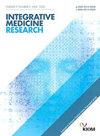一项关于中医与人工智能结合的全国调查:来自健康需求个体的态度和看法
IF 3
4区 医学
Q2 INTEGRATIVE & COMPLEMENTARY MEDICINE
引用次数: 0
摘要
背景中药在医疗保健系统中扮演着不可或缺的角色。人工智能(AI)为中医药现代化开辟了一条新途径,同时也解决了关键的医疗挑战。本全国性调查旨在评估有健康需求的个人对中医与人工智能结合的态度和看法。方法对全国13家医疗机构进行横断面调查。本研究于2025年6月27日至7月11日对2587名有健康需求的患者(包括寻求中西医治疗的患者和进行常规体检的患者)进行结构化、自我报告式问卷调查。结果有1641名受访者(63.4%)熟悉中医-人工智能设备,61.7%的受访者愿意尝试中医与人工智能结合的诊疗服务。43.5%的受访者相信中医-人工智能设备提供的诊断结果。在亚组分析中,18-34岁、本科或大专学历、国家机关工作人员的受访者对中医与人工智能结合的接受度和信任度更高(P < 0.005)。最具应用前景的前三位分别是智能辨证系统(46.9%)、中医四诊仪(39.9%)和智能中药方剂(39.0%)。结论中医与人工智能的融合在中国的求医人群中显示出良好的接受度,对中医有健康需求的年轻、受过教育的人群表现出特别高的信任度,智能辨证系统为人工智能通过提高诊断准确性和治疗个性化来实现中医实践的现代化提供了明确的途径。本文章由计算机程序翻译,如有差异,请以英文原文为准。
A national survey on the integration of traditional Chinese medicine and artificial intelligence: attitudes and perceptions from the individuals with health needs
Background
Traditional Chinese medicine (TCM) plays an indispensable role in the healthcare system. Artificial intelligence (AI) opens a new pathway for TCM modernization, while also addressing critical healthcare challenges. The present national survey was conducted to assess the attitudes and perceptions of individuals with health needs regarding the integration of TCM with AI.
Methods
A cross-sectional national survey was conducted at 13 medical institutions across China. A structured, self-reported questionnaire was administered to 2587 individuals with health needs, including patients seeking TCM/Western medical treatment and individuals undergoing routine physical examinations, between June 27th and July 11th, 2025.
Results
A total of 1641 (63.4 %) respondents were familiar with the TCM-AI equipment, and 61.7 % respondents were willing to try TCM diagnosis and treatment services combined with AI. 43.5 % respondents trusted the diagnosis results provided by the TCM-AI equipment. In the subgroup analysis, respondents aged 18–34, with a bachelor's degree or associate's degree as their educational background, and working as employees of state organs, showed greater acceptance and trust towards the integration of TCM and AI (P < 0.005). The top three most promising applications were the intelligent syndrome differentiation system (46.9 %), TCM four diagnostic instruments (39.9 %), and intelligent TCM formula (39.0 %).
Conclusion
The integration of TCM and AI demonstrates promising acceptance among health-seeking individuals in China, with younger and educated populations who have health demands for TCM showing particularly high trust, and intelligent syndrome differentiation systems highlight a clear pathway for AI to modernize TCM practice by augmenting diagnostic accuracy and treatment personalization.
求助全文
通过发布文献求助,成功后即可免费获取论文全文。
去求助
来源期刊

Integrative Medicine Research
Medicine-Complementary and Alternative Medicine
CiteScore
6.50
自引率
2.90%
发文量
65
审稿时长
12 weeks
期刊介绍:
Integrative Medicine Research (IMR) is a quarterly, peer-reviewed journal focused on scientific research for integrative medicine including traditional medicine (emphasis on acupuncture and herbal medicine), complementary and alternative medicine, and systems medicine. The journal includes papers on basic research, clinical research, methodology, theory, computational analysis and modelling, topical reviews, medical history, education and policy based on physiology, pathology, diagnosis and the systems approach in the field of integrative medicine.
 求助内容:
求助内容: 应助结果提醒方式:
应助结果提醒方式:


